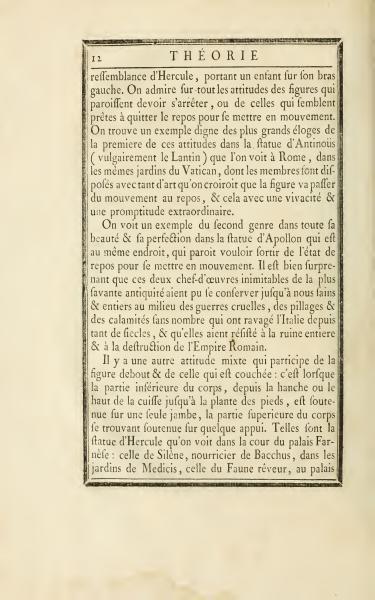THEORY
similarity of Hercules, carrying a child on his left arm. Especially admired are the postures of figures that seem about to stop, or of those that appear ready to abandon rest to start moving. A notable example of the former posture is found in the statue of Antinous (commonly known as the Lantin), which is seen in Rome, within the same Vatican gardens, where the limbs are so artfully arranged that one would think the figure will shift from movement to rest, and this with extraordinary speed and agility.
A specimen of the second type is seen in its full beauty and perfection in the statue of Apollo, located in the same place, which appears ready to leave the state of rest to embark on motion. It is indeed surprising that these two unparalleled masterpieces of the most learned antiquity have been preserved unharmed to us amidst cruel wars, plundering, and countless calamities that have ravaged Italy for centuries, and that they have withstood complete ruin and the destruction of the Roman Empire.
There is another mixed posture participating in the standing figure and the reclining figure: it is when the lower part of the body, from the hip or the top of the thigh to the soles of the feet, is supported on a single leg, while the upper part of the body finds support on some prop. Such are the statue of Hercules seen in the courtyard of the Farnese Palace: that of Silenus, the nurturer of Bacchus, in the Medici gardens, and that of the Dreaming Faun, in the palace.
Translation Notes
Antinous: A favorite companion of the Roman Emperor Hadrian, known for his beauty and tragic death.
Silenus: A companion and tutor to the wine god Bacchus in Roman mythology.
The text discusses notable postures observed in historical sculptures, particularly those of Hercules, Antinous, and Apollo. These figures illustrate transitions from stillness to movement, with examples found in various renowned statues. The text highlights the remarkable preservation of these masterpieces through centuries of turmoil, as well as a description of mixed postures found in some sculptures.
